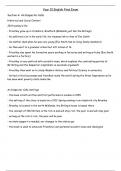Year 10 English Final Exam
Section A: An Inspector Calls
Historical and Social Context
JB Priestley’s life
- Priestley grew up in Yorkshire, Bradford (Midlands just like the Birlings)
- he suffered a lot in his early life, his traumas link to that of Eva Smith
- his mother died when he was very young (Eva Smith has no living family members)
- he then went to a grammar school but left school at 16
- Priestley also spent his formative years working in factories and writing articles (Eva Smith
worked in a factory)
- Priestley is very political with socialist views, which explains the contrasting parties of
Mr Birling and the Inspector (capitalism vs socialism argument)
- Priestley then went on to study Modern History and Political Science in university
- he had critical successes and travelled round the world during the Great Depression so he
has seen what poverty state looks like
An Inspector Calls Settings
- the book is both written and first performed in London in 1945
- the setting of the story is based on a 1912 Spring evening in an industrial city Brumley
- Brumley is located in the north Midlands, the Birling’s house is based there
- the concept of 1912 Britain is the rich is and will stay rich, the poor is and will stay poor
- as long as the rich is rich, the poor will be poor
- no state support is needed, nor changes to the status quo
- this book is used to advocate Priestley’s own personal socialist views and ideologies
,Character Analysation
Mr Arthur Birling
- dominant, patriarchal figure, a traditional patriarch, a businessman, owns a wool factory
- presented as powerful through the way he controls conversations
- wealthy and pleased with himself but still wishes for greater social status
- believes he has wisdom and experience but is constantly undermined with dramatic irony
- the Inspector challenges all of Birling’s qualities of dominance and power
- created as a character antithesis to the Inspector
- full of pride and very boastful, loves being the centre of attention
- upper middle class, desperate for the possible knighthood as that would give him status
- always talks about himself, reminds others pf his important status in the Brumley society
- a capitalist standpoint and approves of hierarchy within the society
- self-absorbed, only sees the world from his own perspective or that of his family
- but only the reputation of his family, not their feelings or well-being
- prioritises (his own) money, status and power over people, humans in general
- very reactive, angry and quick to be insulted
- wants to conceal wrongdoings if it will tarnish himself or more importantly, his image
- often appears as confused or outrage to audience, oblivious to his own failed intelligence
Quotes
- “I speak as a hard-headed businessman who has to take risks” Alliteration
- “As if we were all mixed up together like bees in a hive” Simile
- “A man has to make his own way … look after himself and his own – and –”
Cyclical Structure & Polysyndeton
- “Look Inspector, you’re not trying to tell us that – my boy – … in this- ?”
Pace (trying to control his speech and emotions by using a slower pace)
- “Look, Inspector – I’d give you thousands – yes, thousands-”
Repetition of “thousands” and “Look Inspector” try and rein some control over the situation
- Now look at the pair of them … they can’t even take a joke-”
Cyclical Structure of interrupted speech
- “Because you’re not the kind of father a chap could go to … ” Contrast to start of the play
, The Inspector Goole
- a mysterious and powerful figure, audience knows almost nothing about him
- “need not be a big man but be creates at once an impression of massiveness”
- not intimidated by the Birling’s superior class even though he is classless
- displays socialism and morality, sympathises with the working poor
- shows empathy for others and understands their motive
- creates conflict and exposes the other characters on stage
- wants to expose wrongdoing, very direct and open, almost too honest
- socialist standpoint, wants more equality in the society, rather than selfishness for himself
- he prioritises people over money, status or power, completely the opposite of Birling
- blames the rich for exploiting the poor and recognises the vulnerability of the poor
- typically calm but can be abrupt, appears to be all knowing, a very unbreakable façade
- very proactive, systematic and methodical in his way of work
- undermines and belittles Birling
Quotes
- “It’s the way I like to go to work. One person and one line of inquiry at a time.” Isocolon
- “One line of inquiry at a time. …” Isocolon , Repetition
- “You have no hope of not discussing it, Mrs Birling” Litotes
- “Don’t stammer and yammer at me again, man.” Assonance
- “Millions and millions and millions of Eva Smiths and John Smiths”
Tricolon & Polysyndeton, addas a more dramatic effect and severity
- “Their lives, their hopes and fears, their suffering and their chance of happiness” Listing
exclusive language of ‘their’, creates a contrast with inclusive language of “we”
- “We don’t live alone. We are members of one body. We are responsible for each other”
Tricolon
- “fire and blood and anguish” Polysyndeton and tricolon
adds volume and creates an echo effect of his words in the minds of the readers
- “leaving them staring and subdued and wondering ” Sibilance, alliteration & tricolon
emphasises on the effect and presence the Inspector has, even after he has left





